Reflective Essay: Nursing Ethics in John's Palliative Care, University
VerifiedAdded on 2022/09/09
|6
|1735
|46
Essay
AI Summary
This reflective essay delves into the ethical considerations of palliative care in nursing, using the case of John, a 20-year-old Aboriginal Torres Strait Islander with end-stage renal disease. As a registered nurse, the author explores the ethical decision-making process, cultural sensitivity, and the impact on professional practice within the context of John's desire to return home for end-of-life care. The essay addresses the importance of comfort care, the patient's autonomy, and the ethical codes guiding nursing practice. It highlights the challenges nurses face in providing end-of-life care, emphasizing the significance of respecting patient preferences, cultural values, and the role of the interdisciplinary team. The author reflects on personal and professional values, advocating for the integration of nursing philosophy into the curriculum to better prepare students for ethical dilemmas. The essay concludes by underscoring the need for nurses to understand their values and prioritize patient dignity and autonomy in palliative care, ensuring a good death surrounded by loved ones.
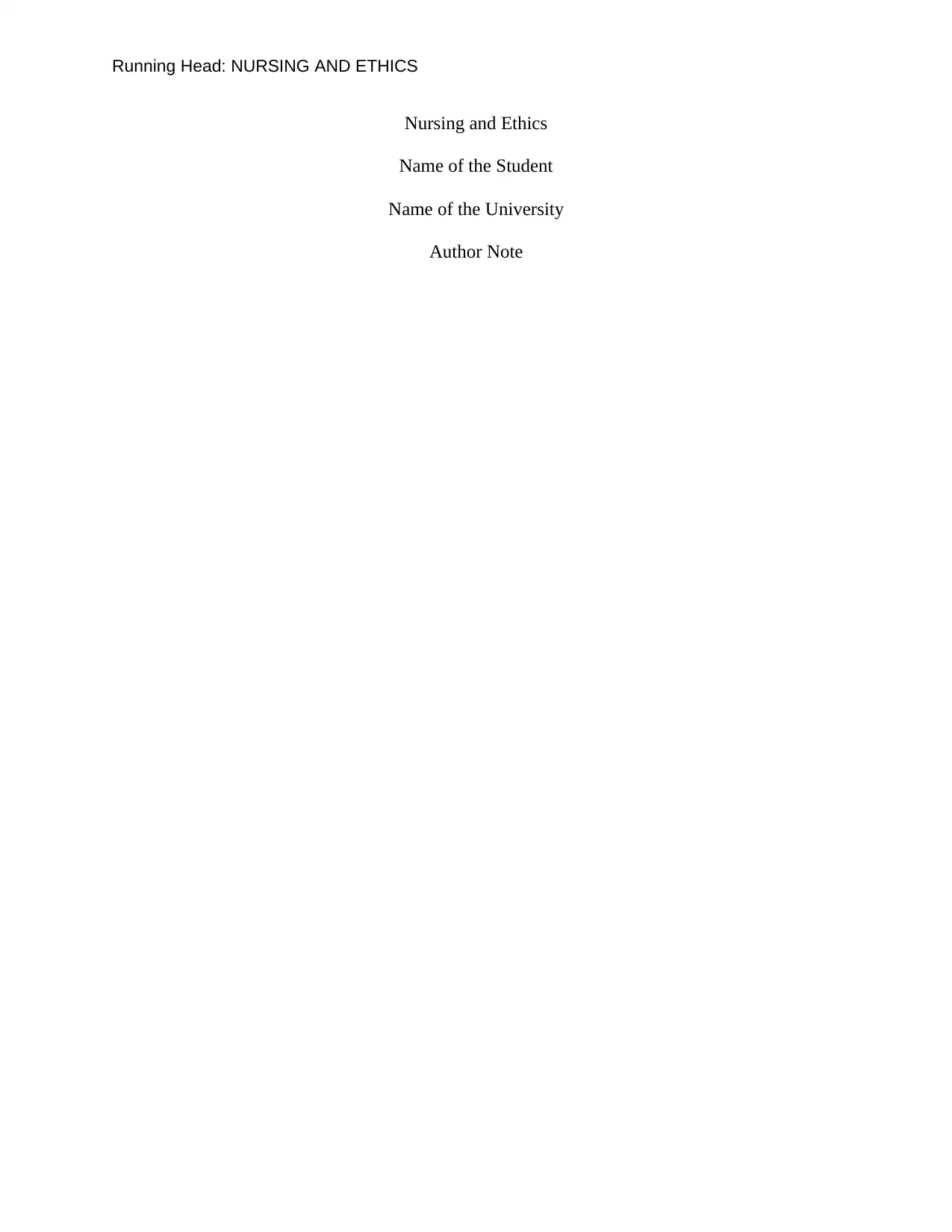
Running Head: NURSING AND ETHICS
Nursing and Ethics
Name of the Student
Name of the University
Author Note
Nursing and Ethics
Name of the Student
Name of the University
Author Note
Paraphrase This Document
Need a fresh take? Get an instant paraphrase of this document with our AI Paraphraser
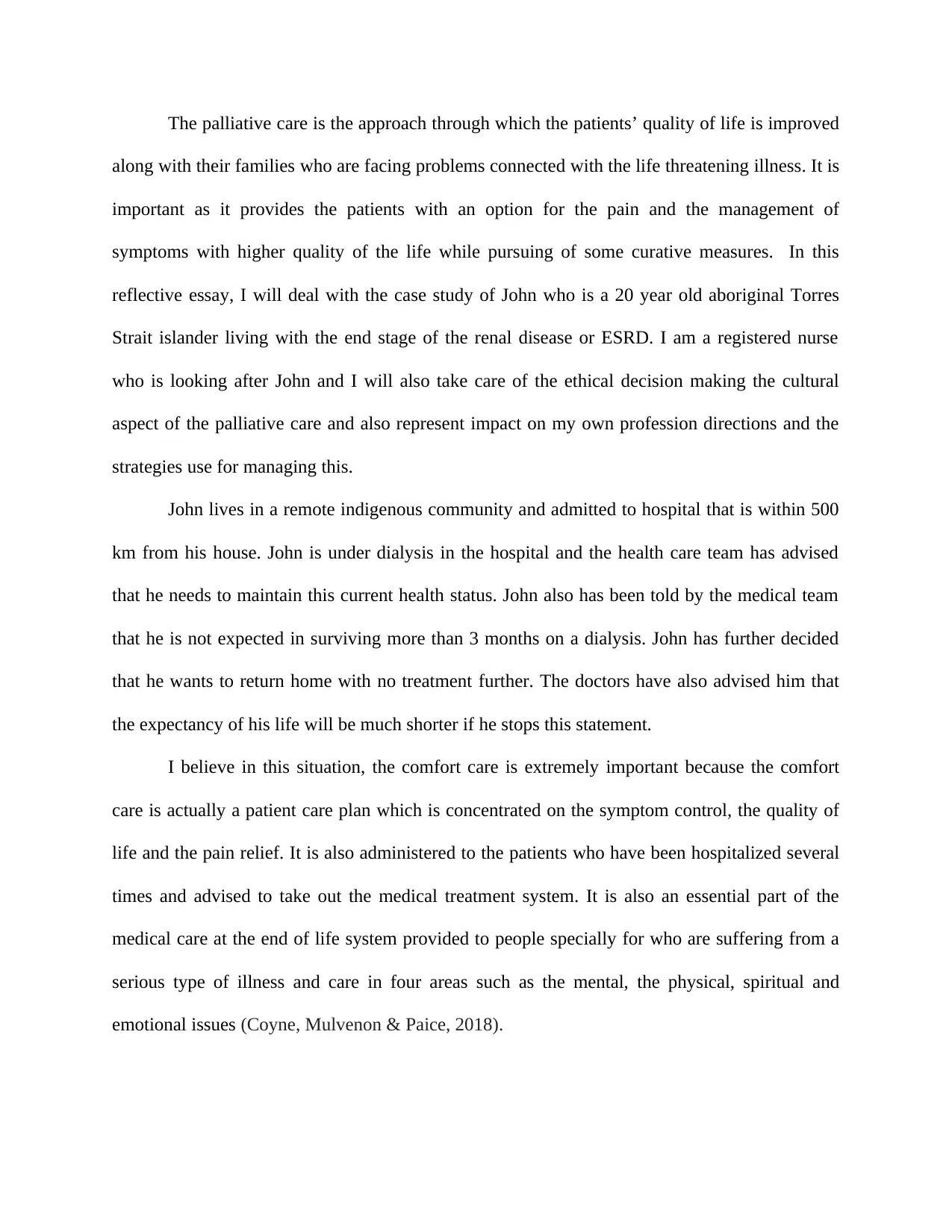
The palliative care is the approach through which the patients’ quality of life is improved
along with their families who are facing problems connected with the life threatening illness. It is
important as it provides the patients with an option for the pain and the management of
symptoms with higher quality of the life while pursuing of some curative measures. In this
reflective essay, I will deal with the case study of John who is a 20 year old aboriginal Torres
Strait islander living with the end stage of the renal disease or ESRD. I am a registered nurse
who is looking after John and I will also take care of the ethical decision making the cultural
aspect of the palliative care and also represent impact on my own profession directions and the
strategies use for managing this.
John lives in a remote indigenous community and admitted to hospital that is within 500
km from his house. John is under dialysis in the hospital and the health care team has advised
that he needs to maintain this current health status. John also has been told by the medical team
that he is not expected in surviving more than 3 months on a dialysis. John has further decided
that he wants to return home with no treatment further. The doctors have also advised him that
the expectancy of his life will be much shorter if he stops this statement.
I believe in this situation, the comfort care is extremely important because the comfort
care is actually a patient care plan which is concentrated on the symptom control, the quality of
life and the pain relief. It is also administered to the patients who have been hospitalized several
times and advised to take out the medical treatment system. It is also an essential part of the
medical care at the end of life system provided to people specially for who are suffering from a
serious type of illness and care in four areas such as the mental, the physical, spiritual and
emotional issues (Coyne, Mulvenon & Paice, 2018).
along with their families who are facing problems connected with the life threatening illness. It is
important as it provides the patients with an option for the pain and the management of
symptoms with higher quality of the life while pursuing of some curative measures. In this
reflective essay, I will deal with the case study of John who is a 20 year old aboriginal Torres
Strait islander living with the end stage of the renal disease or ESRD. I am a registered nurse
who is looking after John and I will also take care of the ethical decision making the cultural
aspect of the palliative care and also represent impact on my own profession directions and the
strategies use for managing this.
John lives in a remote indigenous community and admitted to hospital that is within 500
km from his house. John is under dialysis in the hospital and the health care team has advised
that he needs to maintain this current health status. John also has been told by the medical team
that he is not expected in surviving more than 3 months on a dialysis. John has further decided
that he wants to return home with no treatment further. The doctors have also advised him that
the expectancy of his life will be much shorter if he stops this statement.
I believe in this situation, the comfort care is extremely important because the comfort
care is actually a patient care plan which is concentrated on the symptom control, the quality of
life and the pain relief. It is also administered to the patients who have been hospitalized several
times and advised to take out the medical treatment system. It is also an essential part of the
medical care at the end of life system provided to people specially for who are suffering from a
serious type of illness and care in four areas such as the mental, the physical, spiritual and
emotional issues (Coyne, Mulvenon & Paice, 2018).
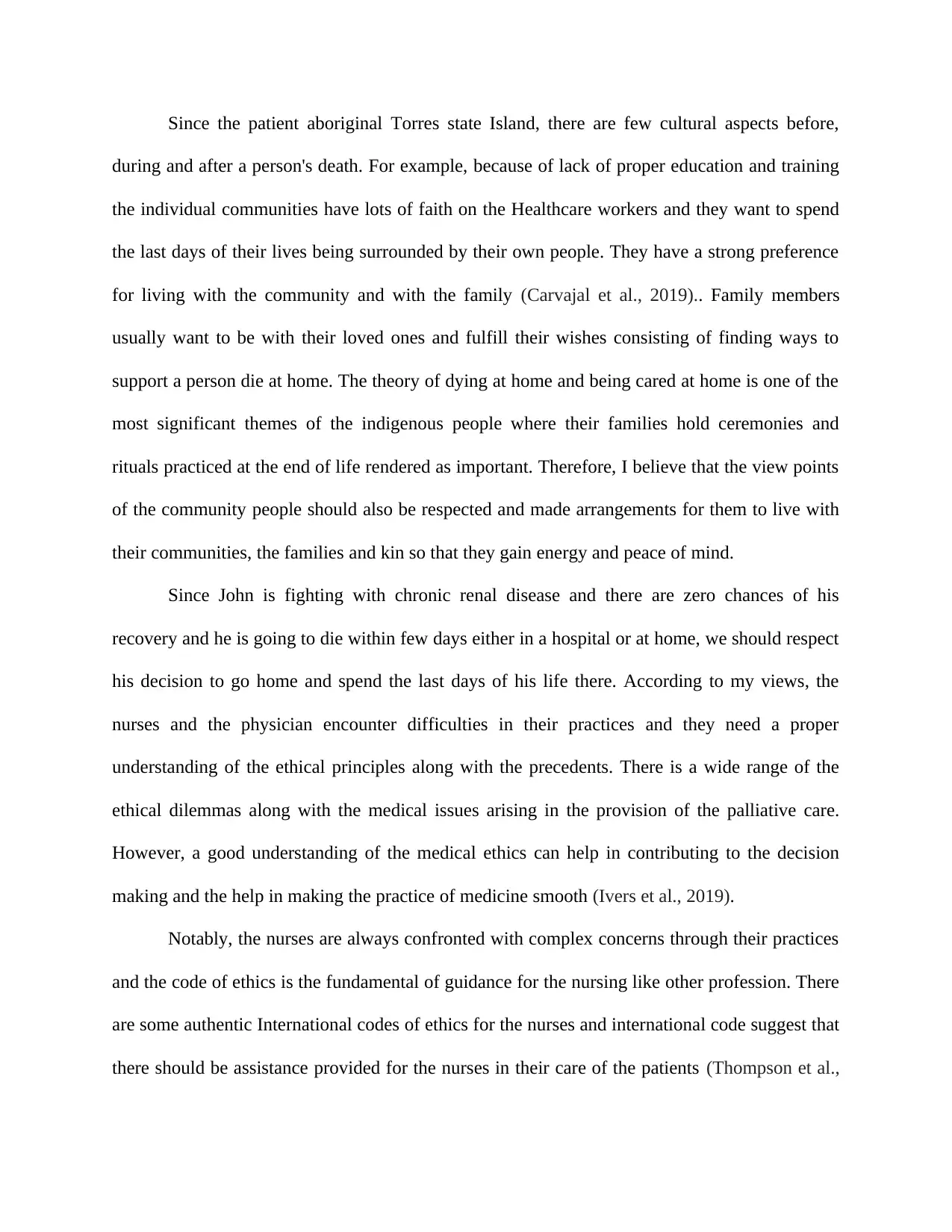
Since the patient aboriginal Torres state Island, there are few cultural aspects before,
during and after a person's death. For example, because of lack of proper education and training
the individual communities have lots of faith on the Healthcare workers and they want to spend
the last days of their lives being surrounded by their own people. They have a strong preference
for living with the community and with the family (Carvajal et al., 2019).. Family members
usually want to be with their loved ones and fulfill their wishes consisting of finding ways to
support a person die at home. The theory of dying at home and being cared at home is one of the
most significant themes of the indigenous people where their families hold ceremonies and
rituals practiced at the end of life rendered as important. Therefore, I believe that the view points
of the community people should also be respected and made arrangements for them to live with
their communities, the families and kin so that they gain energy and peace of mind.
Since John is fighting with chronic renal disease and there are zero chances of his
recovery and he is going to die within few days either in a hospital or at home, we should respect
his decision to go home and spend the last days of his life there. According to my views, the
nurses and the physician encounter difficulties in their practices and they need a proper
understanding of the ethical principles along with the precedents. There is a wide range of the
ethical dilemmas along with the medical issues arising in the provision of the palliative care.
However, a good understanding of the medical ethics can help in contributing to the decision
making and the help in making the practice of medicine smooth (Ivers et al., 2019).
Notably, the nurses are always confronted with complex concerns through their practices
and the code of ethics is the fundamental of guidance for the nursing like other profession. There
are some authentic International codes of ethics for the nurses and international code suggest that
there should be assistance provided for the nurses in their care of the patients (Thompson et al.,
during and after a person's death. For example, because of lack of proper education and training
the individual communities have lots of faith on the Healthcare workers and they want to spend
the last days of their lives being surrounded by their own people. They have a strong preference
for living with the community and with the family (Carvajal et al., 2019).. Family members
usually want to be with their loved ones and fulfill their wishes consisting of finding ways to
support a person die at home. The theory of dying at home and being cared at home is one of the
most significant themes of the indigenous people where their families hold ceremonies and
rituals practiced at the end of life rendered as important. Therefore, I believe that the view points
of the community people should also be respected and made arrangements for them to live with
their communities, the families and kin so that they gain energy and peace of mind.
Since John is fighting with chronic renal disease and there are zero chances of his
recovery and he is going to die within few days either in a hospital or at home, we should respect
his decision to go home and spend the last days of his life there. According to my views, the
nurses and the physician encounter difficulties in their practices and they need a proper
understanding of the ethical principles along with the precedents. There is a wide range of the
ethical dilemmas along with the medical issues arising in the provision of the palliative care.
However, a good understanding of the medical ethics can help in contributing to the decision
making and the help in making the practice of medicine smooth (Ivers et al., 2019).
Notably, the nurses are always confronted with complex concerns through their practices
and the code of ethics is the fundamental of guidance for the nursing like other profession. There
are some authentic International codes of ethics for the nurses and international code suggest that
there should be assistance provided for the nurses in their care of the patients (Thompson et al.,
⊘ This is a preview!⊘
Do you want full access?
Subscribe today to unlock all pages.

Trusted by 1+ million students worldwide
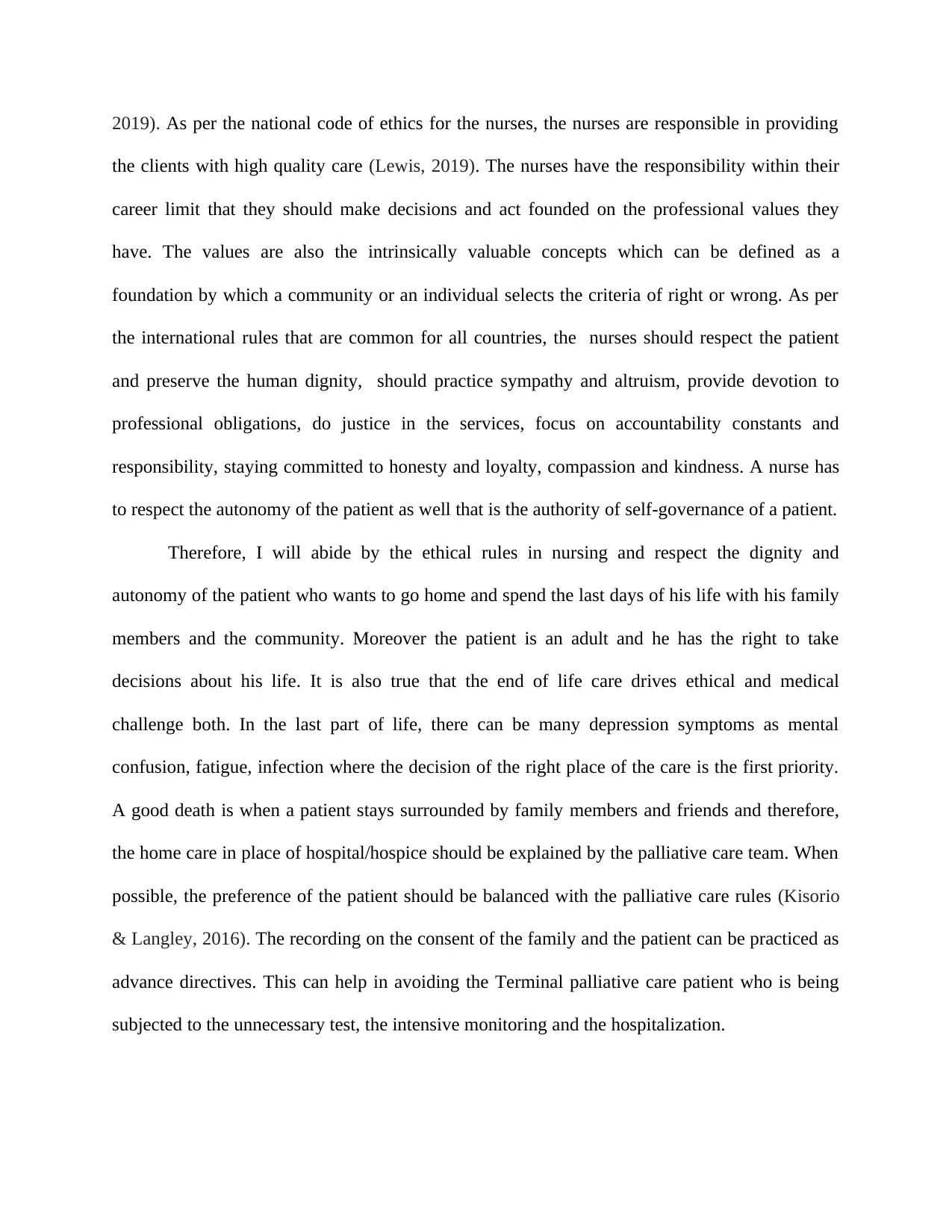
2019). As per the national code of ethics for the nurses, the nurses are responsible in providing
the clients with high quality care (Lewis, 2019). The nurses have the responsibility within their
career limit that they should make decisions and act founded on the professional values they
have. The values are also the intrinsically valuable concepts which can be defined as a
foundation by which a community or an individual selects the criteria of right or wrong. As per
the international rules that are common for all countries, the nurses should respect the patient
and preserve the human dignity, should practice sympathy and altruism, provide devotion to
professional obligations, do justice in the services, focus on accountability constants and
responsibility, staying committed to honesty and loyalty, compassion and kindness. A nurse has
to respect the autonomy of the patient as well that is the authority of self-governance of a patient.
Therefore, I will abide by the ethical rules in nursing and respect the dignity and
autonomy of the patient who wants to go home and spend the last days of his life with his family
members and the community. Moreover the patient is an adult and he has the right to take
decisions about his life. It is also true that the end of life care drives ethical and medical
challenge both. In the last part of life, there can be many depression symptoms as mental
confusion, fatigue, infection where the decision of the right place of the care is the first priority.
A good death is when a patient stays surrounded by family members and friends and therefore,
the home care in place of hospital/hospice should be explained by the palliative care team. When
possible, the preference of the patient should be balanced with the palliative care rules (Kisorio
& Langley, 2016). The recording on the consent of the family and the patient can be practiced as
advance directives. This can help in avoiding the Terminal palliative care patient who is being
subjected to the unnecessary test, the intensive monitoring and the hospitalization.
the clients with high quality care (Lewis, 2019). The nurses have the responsibility within their
career limit that they should make decisions and act founded on the professional values they
have. The values are also the intrinsically valuable concepts which can be defined as a
foundation by which a community or an individual selects the criteria of right or wrong. As per
the international rules that are common for all countries, the nurses should respect the patient
and preserve the human dignity, should practice sympathy and altruism, provide devotion to
professional obligations, do justice in the services, focus on accountability constants and
responsibility, staying committed to honesty and loyalty, compassion and kindness. A nurse has
to respect the autonomy of the patient as well that is the authority of self-governance of a patient.
Therefore, I will abide by the ethical rules in nursing and respect the dignity and
autonomy of the patient who wants to go home and spend the last days of his life with his family
members and the community. Moreover the patient is an adult and he has the right to take
decisions about his life. It is also true that the end of life care drives ethical and medical
challenge both. In the last part of life, there can be many depression symptoms as mental
confusion, fatigue, infection where the decision of the right place of the care is the first priority.
A good death is when a patient stays surrounded by family members and friends and therefore,
the home care in place of hospital/hospice should be explained by the palliative care team. When
possible, the preference of the patient should be balanced with the palliative care rules (Kisorio
& Langley, 2016). The recording on the consent of the family and the patient can be practiced as
advance directives. This can help in avoiding the Terminal palliative care patient who is being
subjected to the unnecessary test, the intensive monitoring and the hospitalization.
Paraphrase This Document
Need a fresh take? Get an instant paraphrase of this document with our AI Paraphraser
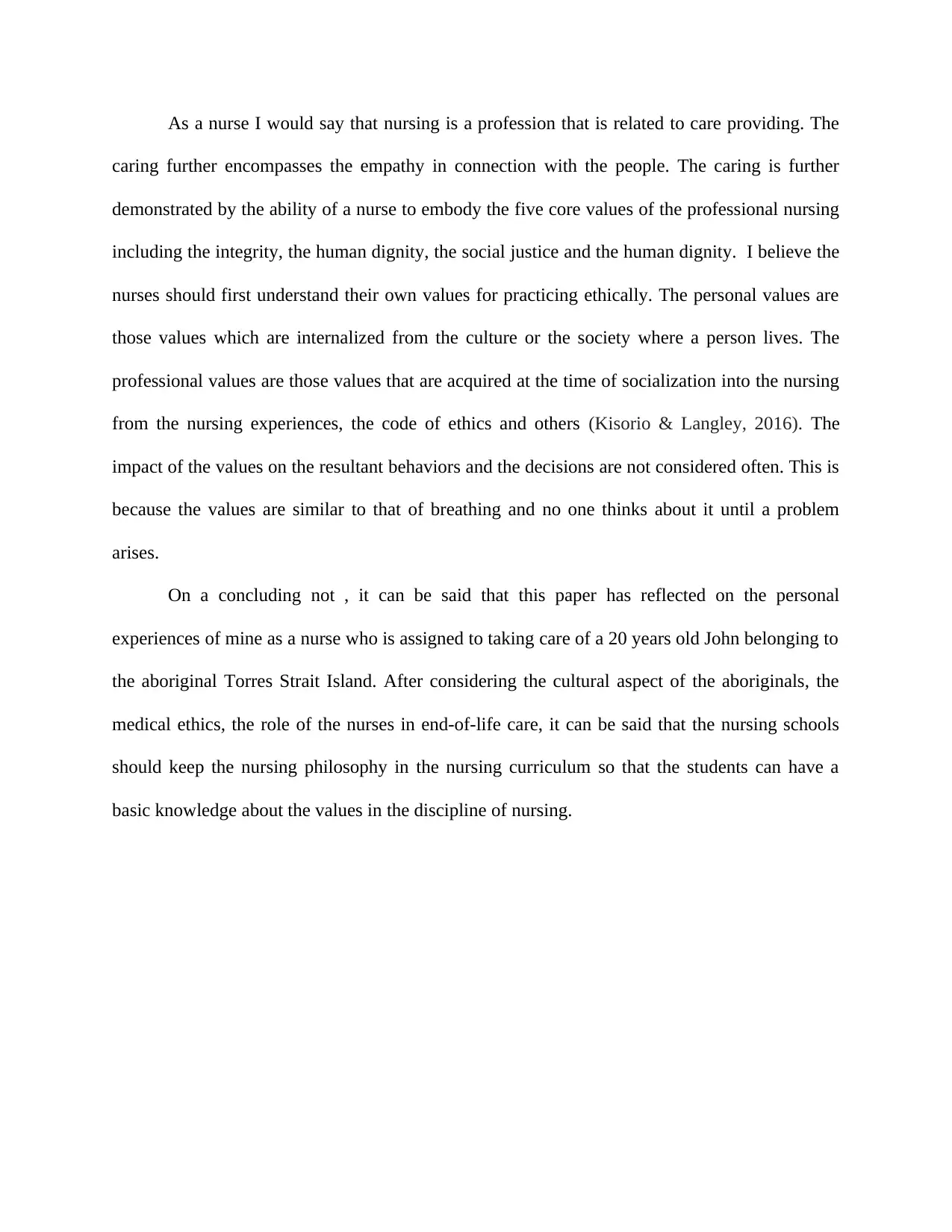
As a nurse I would say that nursing is a profession that is related to care providing. The
caring further encompasses the empathy in connection with the people. The caring is further
demonstrated by the ability of a nurse to embody the five core values of the professional nursing
including the integrity, the human dignity, the social justice and the human dignity. I believe the
nurses should first understand their own values for practicing ethically. The personal values are
those values which are internalized from the culture or the society where a person lives. The
professional values are those values that are acquired at the time of socialization into the nursing
from the nursing experiences, the code of ethics and others (Kisorio & Langley, 2016). The
impact of the values on the resultant behaviors and the decisions are not considered often. This is
because the values are similar to that of breathing and no one thinks about it until a problem
arises.
On a concluding not , it can be said that this paper has reflected on the personal
experiences of mine as a nurse who is assigned to taking care of a 20 years old John belonging to
the aboriginal Torres Strait Island. After considering the cultural aspect of the aboriginals, the
medical ethics, the role of the nurses in end-of-life care, it can be said that the nursing schools
should keep the nursing philosophy in the nursing curriculum so that the students can have a
basic knowledge about the values in the discipline of nursing.
caring further encompasses the empathy in connection with the people. The caring is further
demonstrated by the ability of a nurse to embody the five core values of the professional nursing
including the integrity, the human dignity, the social justice and the human dignity. I believe the
nurses should first understand their own values for practicing ethically. The personal values are
those values which are internalized from the culture or the society where a person lives. The
professional values are those values that are acquired at the time of socialization into the nursing
from the nursing experiences, the code of ethics and others (Kisorio & Langley, 2016). The
impact of the values on the resultant behaviors and the decisions are not considered often. This is
because the values are similar to that of breathing and no one thinks about it until a problem
arises.
On a concluding not , it can be said that this paper has reflected on the personal
experiences of mine as a nurse who is assigned to taking care of a 20 years old John belonging to
the aboriginal Torres Strait Island. After considering the cultural aspect of the aboriginals, the
medical ethics, the role of the nurses in end-of-life care, it can be said that the nursing schools
should keep the nursing philosophy in the nursing curriculum so that the students can have a
basic knowledge about the values in the discipline of nursing.
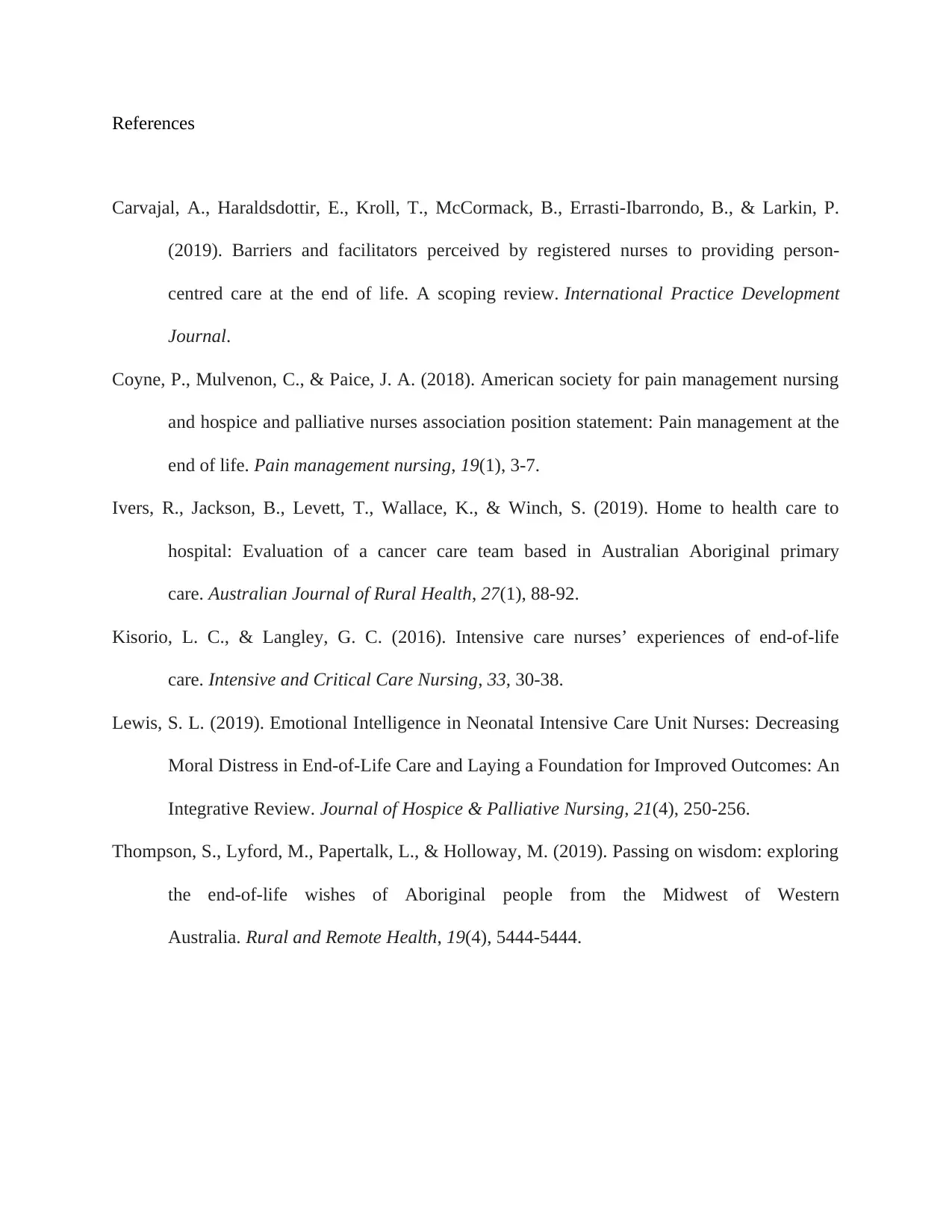
References
Carvajal, A., Haraldsdottir, E., Kroll, T., McCormack, B., Errasti-Ibarrondo, B., & Larkin, P.
(2019). Barriers and facilitators perceived by registered nurses to providing person-
centred care at the end of life. A scoping review. International Practice Development
Journal.
Coyne, P., Mulvenon, C., & Paice, J. A. (2018). American society for pain management nursing
and hospice and palliative nurses association position statement: Pain management at the
end of life. Pain management nursing, 19(1), 3-7.
Ivers, R., Jackson, B., Levett, T., Wallace, K., & Winch, S. (2019). Home to health care to
hospital: Evaluation of a cancer care team based in Australian Aboriginal primary
care. Australian Journal of Rural Health, 27(1), 88-92.
Kisorio, L. C., & Langley, G. C. (2016). Intensive care nurses’ experiences of end-of-life
care. Intensive and Critical Care Nursing, 33, 30-38.
Lewis, S. L. (2019). Emotional Intelligence in Neonatal Intensive Care Unit Nurses: Decreasing
Moral Distress in End-of-Life Care and Laying a Foundation for Improved Outcomes: An
Integrative Review. Journal of Hospice & Palliative Nursing, 21(4), 250-256.
Thompson, S., Lyford, M., Papertalk, L., & Holloway, M. (2019). Passing on wisdom: exploring
the end-of-life wishes of Aboriginal people from the Midwest of Western
Australia. Rural and Remote Health, 19(4), 5444-5444.
Carvajal, A., Haraldsdottir, E., Kroll, T., McCormack, B., Errasti-Ibarrondo, B., & Larkin, P.
(2019). Barriers and facilitators perceived by registered nurses to providing person-
centred care at the end of life. A scoping review. International Practice Development
Journal.
Coyne, P., Mulvenon, C., & Paice, J. A. (2018). American society for pain management nursing
and hospice and palliative nurses association position statement: Pain management at the
end of life. Pain management nursing, 19(1), 3-7.
Ivers, R., Jackson, B., Levett, T., Wallace, K., & Winch, S. (2019). Home to health care to
hospital: Evaluation of a cancer care team based in Australian Aboriginal primary
care. Australian Journal of Rural Health, 27(1), 88-92.
Kisorio, L. C., & Langley, G. C. (2016). Intensive care nurses’ experiences of end-of-life
care. Intensive and Critical Care Nursing, 33, 30-38.
Lewis, S. L. (2019). Emotional Intelligence in Neonatal Intensive Care Unit Nurses: Decreasing
Moral Distress in End-of-Life Care and Laying a Foundation for Improved Outcomes: An
Integrative Review. Journal of Hospice & Palliative Nursing, 21(4), 250-256.
Thompson, S., Lyford, M., Papertalk, L., & Holloway, M. (2019). Passing on wisdom: exploring
the end-of-life wishes of Aboriginal people from the Midwest of Western
Australia. Rural and Remote Health, 19(4), 5444-5444.
⊘ This is a preview!⊘
Do you want full access?
Subscribe today to unlock all pages.

Trusted by 1+ million students worldwide
1 out of 6
Related Documents
Your All-in-One AI-Powered Toolkit for Academic Success.
+13062052269
info@desklib.com
Available 24*7 on WhatsApp / Email
![[object Object]](/_next/static/media/star-bottom.7253800d.svg)
Unlock your academic potential
Copyright © 2020–2026 A2Z Services. All Rights Reserved. Developed and managed by ZUCOL.





